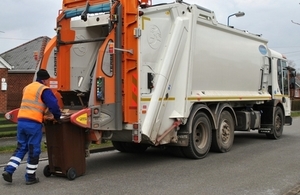Surveillance cameras on bin lorries: Boston Borough Council follows the code
Boston Borough Council introduced surveillance cameras on their bin lorries and ensured compliance with the surveillance camera code of practice.

Bin lorry fitted with a surveillance camera.
Surveillance cameras are everywhere and, as technology advances, so does the way in which surveillance cameras are used. You’re probably used to CCTV in your town centres, but what about cameras on bin lorries?
Boston Borough Council, Lincolnshire, have introduced cameras on their lorries, and as a relevant authority under the Protection of Freedoms Act, they have paid due regard to the surveillance camera code of practice.
Matt Fisher, Operations Manager at Boston Borough Council, said:
We’ve introduced cameras on our refuse lorries to reduce the risk of fraudulent claims for damages or injury, fraudulent insurance claims in respect of accidents and incidents, as well as to improve safety, efficiency, performance and customer service.
The cameras have helped speed up the decision making process around complaints and accident investigation as the evidence secured by cameras has removed the need to make decisions only on the balance of probability.
Being transparent
Principle 3 of the surveillance camera code of practice covers making people aware that cameras are in use – being as transparent and open as possible so that people know who is using the system.
Fisher said:
A key thing for us when we introduced the cameras was to make sure that our residents knew why they were being used. We carried out a media campaign with press articles in local papers, information on our website and all the vehicles are fitted with signage saying who is operating the cameras and where to go for more information.
If you make sure you’re complying with the code, you will only ever use surveillance cameras proportionately, transparently and effectively. There are a number of tools on the Surveillance Camera Commissioner’s website to help organisations comply.
Using the tools and guidance available
Matt said:
We read the code and completed the self assessment tool to challenge our policy and made changes where required. We’ve also published the individual policies on our website and undertook individual privacy impact assessments for all CCTV systems operated at the council.
We would recommend using the code – it’s a helpful guide to compliance and ensures that good governance is in place which is reassuring to members of the public.
So, whether you’re using cameras to keep town centres safe, traffic moving or collecting the rubbish, following the 12 guiding principles in the code will help you use them in a way that supports your communities rather than spy on them.